Stargate SG-1 Season 7
Executive producers: Robert C. Cooper, Michael Greenburg, Richard Dean Anderson
Consulting producer: Brad Wright
Original air dates: June 13, 2003 – March 19, 2004
Mission briefing. The theme of this season is the search for the Lost City of the Ancients—the initial part of which involves finding a naked Jackson, who has de-ascended and remembers nothing. Eventually, his memory of his previous life returns, but he recalls nothing of his time while ascended. Later, Osiris tries to goose Jackson’s quest for the Lost City through his dreams.
Anubis continues to be the major threat to Earth—and the other System Lords—throughout the season. He learns of Naquadria from probing Quinn’s mind and tries to acquire the unstable material from the Kelownans. Afterward, Quinn returns home, his exile lifted, and Jackson rejoins SG-1, though SG-1 eventually returns to aid Quinn in saving his homeworld from earthquakes caused by a new vein of Naquadria. Later, Anubis develops super soldiers known as Kull Warriors, who prove incredibly difficult to stop, as proved when one destroys the Alpha Site.
The Lost City is eventually found—kind of. There’s an Ancient base in Antarctica, which results in Anubis attacking Earth and the Air Force defending the planet against him in a slam-bang finale that includes Hammond in charge of Prometheus and Dr. Elizabeth Weir now in charge of the SGC. That last is due to a change in power: Henry Hayes is the new president, with Kinsey as his vice president, and once he’s briefed on the Stargate program, he insists in civilian oversight. This after his predecessor sends a camera crew to document the Stargate program for that future time when the public learns of the gate.
Prior to being used to defend against Anubis, Prometheus continues to be tested. One such test flight results in contact with an alien presence that causes hallucinations for Carter. Meanwhile O’Neill is cloned by the Asgard, which is something less than a success, and Jackson gets several personalities downloaded into his brain when they encounter a generation ship. He also conscripts Chaka to help negotiate between an SG team and a group of Unas.
Teal’c continues to help build the Jaffa resistance, converting several Jaffa, including Yu’s First Prime, as well as learning of a group of Moloc’s female Jaffa who have created their own rebellion. He also continues to preach Tretonin as an alternative to symbiotes, though he himself has some difficulty adjusting to a life where he doesn’t heal quickly.
Some old friends return: Felger tries to save his job at the SGC with a virus that can shut down a DHD that instead shuts down the entire Stargate network, while Warrick Finn, whom SG-1 rescued, asks for Carter’s help to win a race. And the rogue elements of the NID are still causing trouble, using a Nazi scientist to splice Goa’uld DNA into a cloned human, with disastrous results.
Gate travel still happens, as SG-1 finds a planet where the population keeps decreasing without anyone noticing, and SG-13 goes through the gate only to find a Jaffa ambush—one that claims the life of Dr. Janet Fraiser.
Best episode: “Heroes.” While this two-parter is mostly remembered as the one where Fraiser died—and which spent a lot of time misdirecting us into thinking O’Neill was the one who was killed—it had a lot more going for it, including spectacular guest turns by two brilliant actors in Saul Rubinek and Robert Picardo, as well as a delightful look at another SG team in the Adam Baldwin-led SG-13 that makes you want to know more about the greater tapestry of the SGC. (It also shows up how absurd the franchise’s conceit of concealing the SGC from the public is, but there you go.)
Runners up: “Fragile Balance,” in which Michael Welch does an amazing Richard Dean Anderson impersonation. “Resurrection,” which has a horrific experiment that ties into the show’s mythos very nicely, and is a rare Earth-based episode that feels significant rather than budget-saving filler. “Inauguration,” a clip show that works thanks to some amazing performances in the framing material by the assorted guest stars: Picardo, William Devane as the new president, James Fancy as the Chair of the Joint Chiefs, and old reliable Ronny Cox as Kinsey. “Lost City,” which is an exciting finale that would’ve actually been a worthy series finale if they hadn’t renewed it.
Worst episode: “Space Race.” A plot that belongs in a middling episode of Buck Rogers in the 25th Century or Space: 1999 or the original Battlestar Galactica or some other mediocre 70s show. Just awful on every possible level with one notable exception: Christopher Judge manages the biggest laugh of the entire season just by identifying himself as “Murray.”
Runners up: “Lifeboat,” like “Legacy” in season 3, spends too much time as an acting exercise for Michael Shanks and not enough as an interesting story. “Enemy Mine,” proving that the Unas still aren’t interesting. “Avenger 2.0,” which shows that “The Other Guys” mostly worked because of John Billingsley, whose absence is keenly felt in this unfunny disaster.
Special mention to “Death Knell,” which is actually a great episode on paper, but is a disaster on execution. Not enough time is spent on Carter’s plight, and the collapse of the Tau’ri-Tok’ra-Jaffa rebellion alliance is handled incredibly poorly. Jacob’s being marginalized is actually an interesting plot point, but neither Sebastian Spence’s Tok’ra nor Mark Gibbon’s Jaffa is anyone we give a damn about, so the entire subplot feels oddly removed and inconsequential for something that should be more major. The presence of Bra’tac and of a Tok’ra we actually know would have made this plotline much more convincing; as it stands, it feels irrelevant.
Can’t we just reverse the polarity? Lot of biological experiments gone awry this season, from Loki’s botched clone of O’Neill in “Fragile Balance” to Anubis’s creation of the Kull Warriors using blank-slate hosts in “Evolution” to the NID’s attempts to splice Goa’uld and human DNA together in “Resurrection.”
For cryin’ out loud! The Asgard have protected O’Neill from being cloned, which Loki finds out to his chagrin. O’Neill also gets to have an Ancient repository downloaded into his brain again in “Lost City,” which enables him to operate the device in Antarctica that takes out Anubis’s fleet.
It might work, sir. Busy year for Carter: she helps run a “Space Race,” she holds her own by herself against a Kull Warrior in “Death Knell,” she helps Felger stop “Avenger 2.0” from destroying the Stargate network, she has alien-induced hallucinations of her loved ones on Prometheus in “Grace,” and she starts dating a Denver cop named Pete Shanahan in “Chimera.”
Indeed. Teal’c has trouble adjusting to not having a symbiote larva to heal him, and—as usual—it takes Bra’tac whupping him upside the head for him to snap out of it in “Orpheus.” He also gets a new girlfriend in Ishta in “Birthright.”
I speak 23 different languages—pick one. Jackson is de-ascended, and alive and well, but he only remembers tiny flashes of his time as an ascended being (which proves handy in “Orpheus”). He also gets to save his ex, as he’s able to get Osiris removed from Sarah Gardner at the end of “Chimera.”
You have a go. With President Hayes’s election, Hammond is removed as commander of the SGC, replaced by Weir, in the “Lost City” two-parter. However, this is not a forced retirement, as Hayes wants Hammond closer to him. This is a prelude to season 8, when Hammond will be reassigned to the newly formed Department of Homeworld Security. More immediately, though, he’s in command of Prometheus when Earth forces kick Anubis’s butt.
How do I know what color to wear? Quinn is allowed to go back home, and then falls for a woman who turns out to be a Goa’uld. I hate when that happens…
Wayward home for out-of-work genre actors. In “Heroes,” we get Adam Baldwin, the first of three Firefly alumni to show up (Morena Baccarin will recur in SG-1‘s final two seasons and one of the movies, and Jewel Staite will join the cast of Atlantis); Saul Rubinek, past Star Trek guest and future Warehouse 13 star; and former Star Trek: Voyager star Robert Picardo, who launches his role of Richard Woolsey, which will continue to recur on both SG-1 and Atlantis before becoming an opening-credits regular in the latter’s final season. Jolene Blalock takes a break from Star Trek: Enterprise to play Ishta in “Birthright,” a role she’ll return to in season 9. Enrico Collatoni of Galaxy Quest fame shows up in “Evolution.” Marc Worden, who played Worf’s son Alexander on Star Trek: Deep Space Nine, plays a Jaffa in “Lost City, Part 2.” And Ronny Cox and Ingrid Kavelaars return to play Kinsey and Gant.
Trivial matters. As with season 6, this was intended to be the final season, with the spinoff Atlantis taking over for the 2004/2005 season. However, ratings were strong enough for the Sci-Fi Channel to have two Stargate shows running at once, so plans were changed and SG-1 was renewed for an eighth season.
Richard Dean Anderson continued to have a reduced schedule, appearing minimally (“Fragile Balance,” “Space Race”) or not at all (“Resurrection,” “Inauguration”) in certain episodes.
Michael Shanks cowrites two episodes and Amanda Tapping directs an episode this season. Shanks joins Christopher Judge as an actor who gets a writer credit, while Tapping joins Shanks as an actor who directs. Indeed, “Resurrection” is the only SG-1 that is both written (Shanks) and directed (Tapping) by an actor.
After the president being off-camera and unidentified by name for seven years, the newly elected president is seen and named: Henry Hayes, played by William Devane. Devane previously played President John F. Kennedy in The Missiles of October (the first shot of him in “Inauguration” mirrors a shot of him as JFK in that film), and he’ll go on to play another fictional president on 24: Live Another Day. Devane only appears on the series in the final three episodes of this season, though he’s mentioned several times afterward. An alternate-timeline version of him will appear in the film Continuum.
Corin Nemec appears thrice as Quinn, reduced to guest star status with the return of Michael Shanks. He’s not seen or mentioned again after this season. As for Shanks, he goes from second-billed to getting the “and” credit at the end, allowing Amanda Tapping to keep the second-billed position she was “promoted” to in season 6.
David DeLuise starts the recurring role of Carter’s new beau, Pete Shanahan, making him the fourth DeLuise family member to appear on the show. Peter—besides being a producer and one of the show’s most prolific writers and directors—has made cameos in several episodes and appeared in “Wormhole X-treme!” alongside Michael, and Dom—the father of Peter, Michael, and David—appeared in “Urgo.”
The character of Elizabeth Weir first appears in “Lost City,” played by Jessica Steen. She’ll be replaced by Torri Higginson starting in season 8 and continuing through to Atlantis (and one or two more SG-1 appearances).
The anthology Far Horizons has two excellent sequels to episodes from this season: “Off-Balance” by Sally Malcolm, which looks in on the O’Neill clone from “Fragile Balance” several years later, and “Perceptions” by Diana Dru Botsford, which details the aftermath of Fraiser’s death in “Heroes.”
Chevron seven locked. And so begins the “oh, crap, we have to do another season?” era of SG-1. There are obviously still stories to tell, but at this point, there aren’t enough to justify a score of episodes. When the focus is on the big picture—usually in a two-part episode—then the writing and acting is usually at its best. It really would have been better for the storytelling to reduce the seasonal order to ten episodes or so.
Instead, we get a few standouts where important things happen and a lot of nonsense in between. In particular, there’s a tiresome trend of breaking the team up for individual storylines (“Orpheus,” “Chimera,” “Grace,” “Birthright”). There’s just a lot of mediocrity here, from the totally blown opportunity of “Death Knell” to the aggressively awful “Space Race” to the paint-by-numbers offworld adventures “Revisions” and “Fallout.”
Anubis is a good bad guy, a true threat to our heroes, and it results in a truly spectacular finale. But too much time is spent stumbling around looking for the Lost City, which is practically wearing a neon sign saying, “we’re setting up the spinoff.”
Keith R.A. DeCandido‘s latest fiction release is “Down to the Waterline,” an urban fantasy set in Key West, Florida involving nixies, ghosts, scuba diving, rock and roll, mysterious murders, and the evils of spam filters. The story is free on the online magazine Buzzy Mag. It’s one of several Key West urban fantasies Keith has written, many of which can be found in the collection Ragnarok and Roll: Tales of Cassie Zukav, Weirdness Magnet.










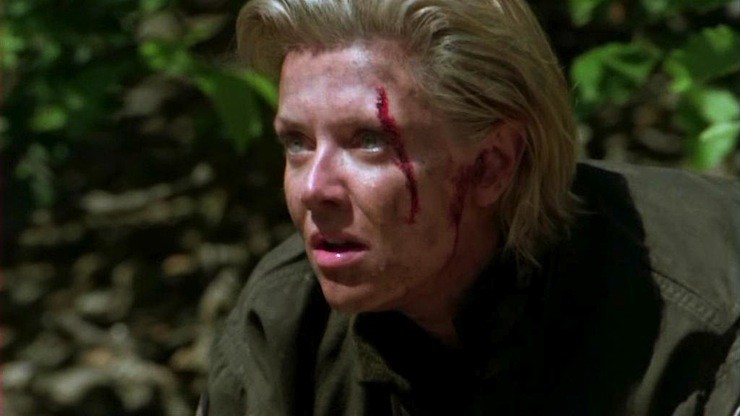
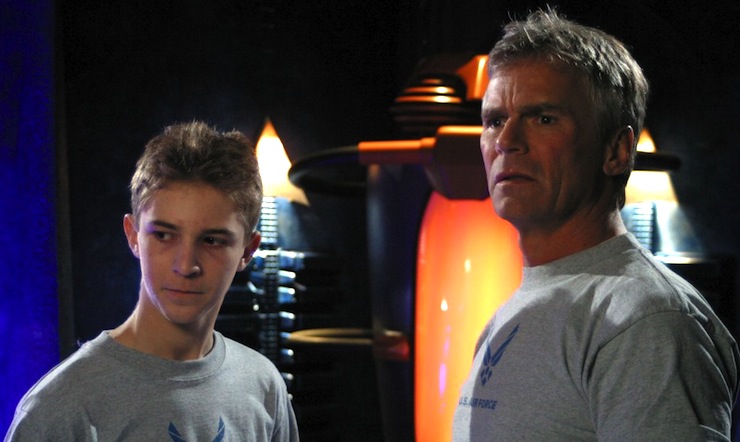
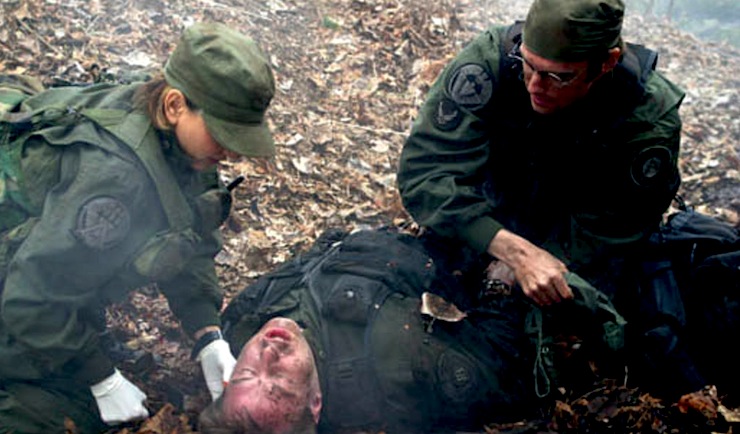
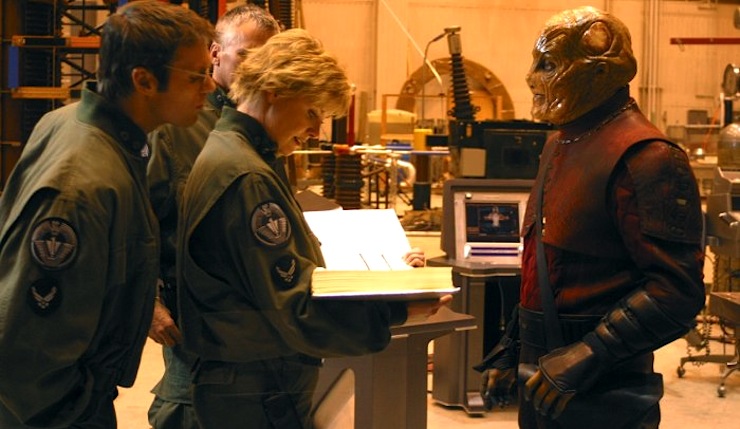
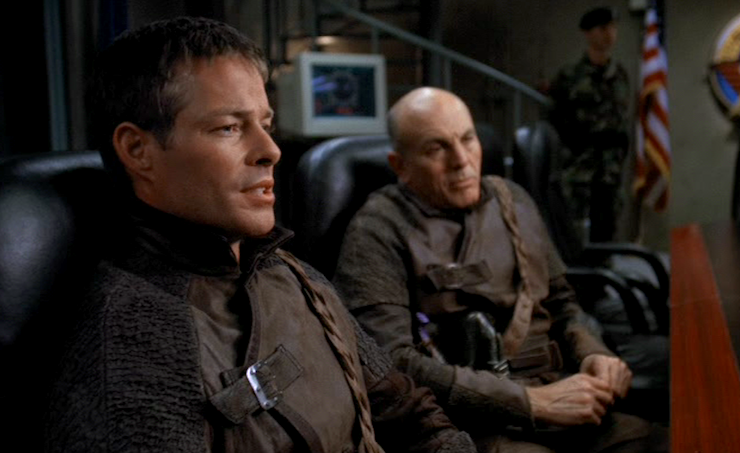
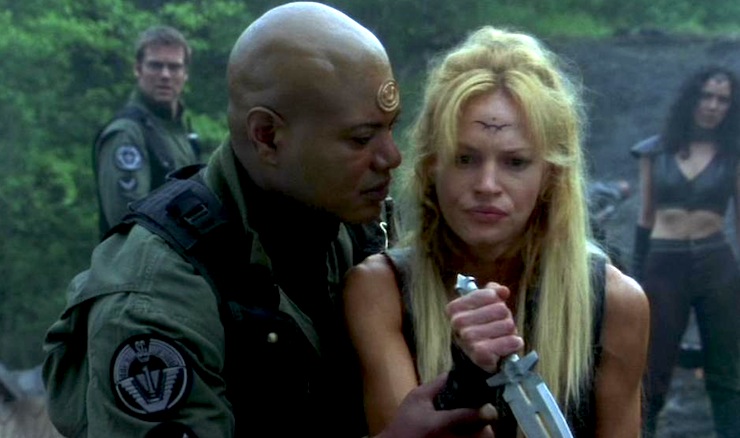
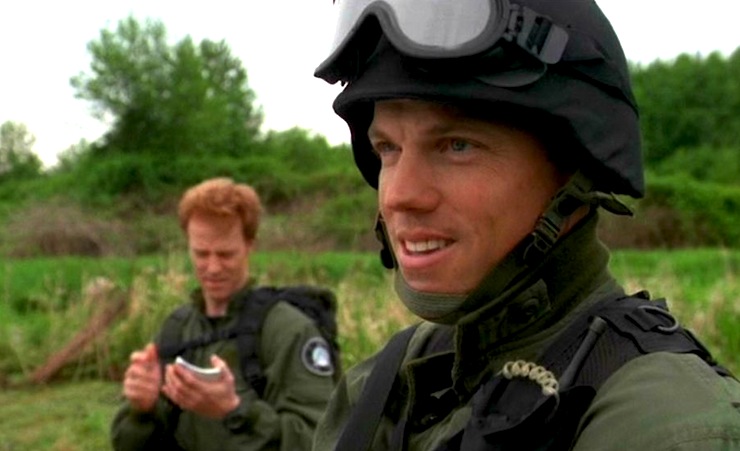
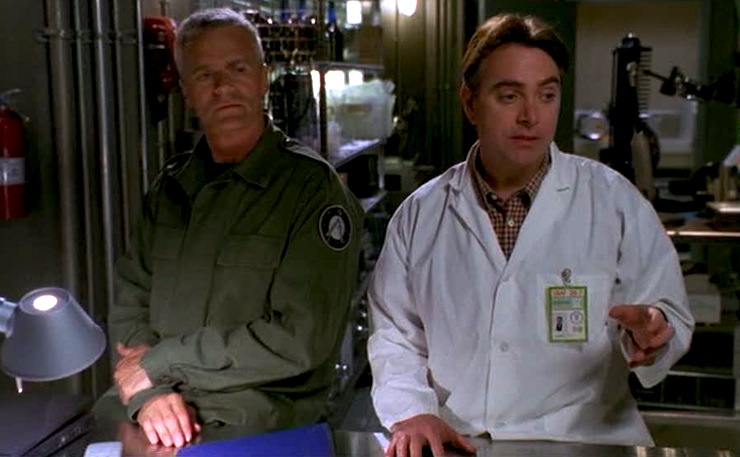
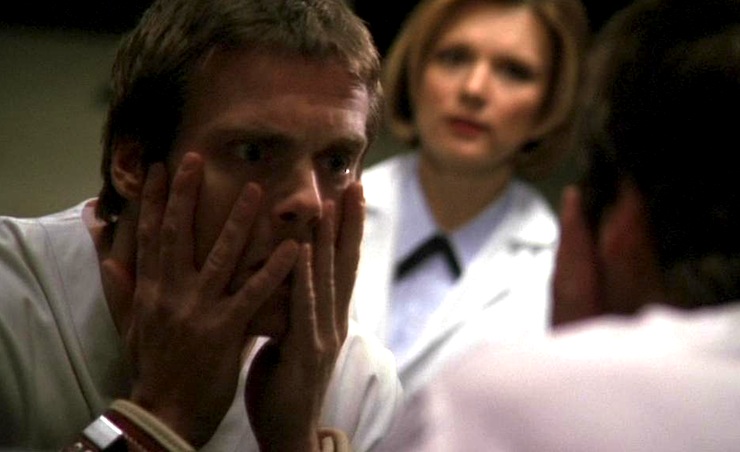
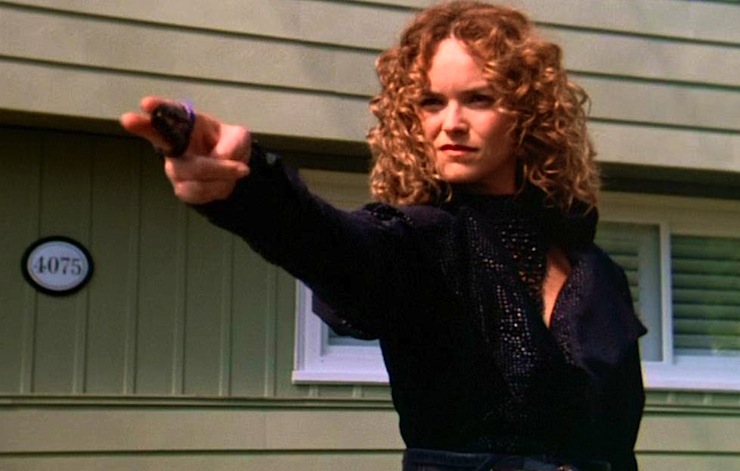
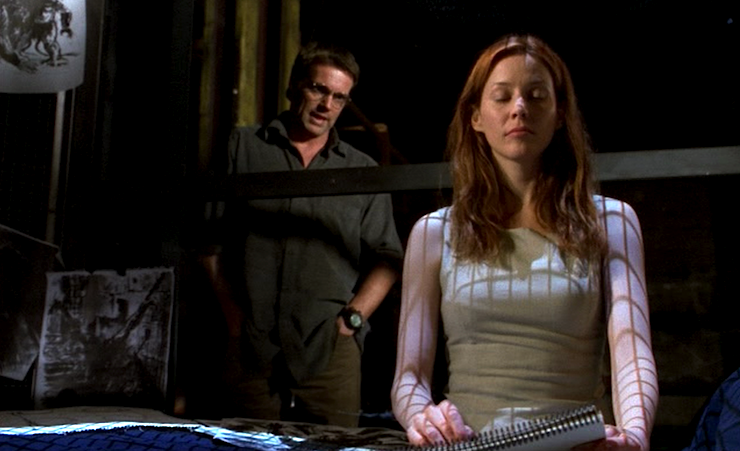
One more “Wayward home for genre actors” entry: Jessica Steen, who played Dr. Weir in “The Lost City,” was one of the main cast members of the Saturday morning show Captain Power and the Soldiers of the Future, which was produced by J. Michael Straczynski before he did Babylon 5.
“Heroes” was definitely the high point here. I loved it that they finally confronted the problems with the whole secrecy angle, and Saul Rubinek was utterly brilliant as Emmett Bregman, a character I really wish they’d brought back later. There was some really powerful drama here.
“Inauguration” was also surprisingly good for a clip show, and it benefited from being able to use the pre-existing White House sets that had been built in Vancouver for X2: X-Men United. My one problem with it is that the opening scene with President Hayes walking through the halls and getting briefed was clearly written to emulate a West Wing-style walk-and-talk scene, but was directed in a slow and lackadaisical manner rather than the fast and lively pace that such a scene should’ve had.”Revisions” was pretty good too, IIRC, an interesting mystery and a creepy SF concept. I did like Shanks’s acting in “Lifeboat,” though I could see the self-indulgence of the exercise. And “Avenger 2.0″ was at least worthwhile for the insights it provided into the Stargate network, although Felger’s fantasies about Carter were rather annoying.
”Fallen” is the one with the blatantly Star Warsy space battle around Anubis’s mothership, complete with an exhaust port — sorry, “ventilation shaft” in this case, reputedly to cool Anubis’s superweapon — to provide access for the big boom. Which always annoyed me, not only because it was so derivative, but also because ships in vacuum wouldn’t use ventilation shafts to cool things; that would require wasting precious atmosphere by venting it to space. What you’d need is a cooling fin or sail, something with a large surface area that you could pass coolant fluid or water through to radiate excess heat into vacuum. Without atmosphere, without conduction or convection, radiation is the only way to dump heat. Which, really, is a problem with most sci-fi spaceship design, since ships really should have big cooling sails or fins, but almost never do.
I’m sure I remember a report going around at the time this season was broadcast that Space Race was an unproduced Star Trek: Voyager script that got re-pitched to the Stargate showrunners as ‘Gate script. I don’t know how true that was, but I could believe it. It certainly would not take much to retool it into a Voyager script.
Heroes I remember, because we knew RDA was wanting out and it was a very real possibility with the way it futzed around with him that he could be the one shot. It also had so much potential for the Gate going public, that I wonder if that was to be the plan for Atlantis. That the interviews and filming in Heroes was going to set up the dumping of the masquerade. Sad to see them lose Janet in that instead.
This is actually one of my favorite seasons, and the first one I knowingly watched as it aired. I first became interested in SG-1 when I was in Ireland in the beginning of 2003, and my flatmate would watch it all the time, so I was seeing season 6 as it aired and a bunch of reruns of other seasons; I remember seeing the end of 4 and the beginning of 5 in particular, and then I think season 1 started over. When I got home, I found out season 7 was starting in the summer, and I felt in the know since I had seen the end of season 6. I also found out the old seasons were on reruns every Monday night.
I tend to stay away from “Lifeboat” and “Space Race.” There are a couple others I’m “meh” on, but I like most of the episodes. Funny story: When I was 14ish, I wrote down several episode ideas for a new series of Star Trek that I made up in my mind. They were probably mostly really really bad, with one where the characters are shrunk down inside the computer core, but one that sticks out in my head is one where the Federation characters had to be in a shuttle race against the Ferengi. I called it, “Space Race.” I’m wondering how this paper got into the writers’ hands, and why they didn’t realize it was no good.
You forgot to mention that William Devane plays yet another fictional president in Dark Knight Rises.
And I can’t help when I see David DeLuise but think, “I know what you’re thinking–you’re thinking Beneful!”
@3 I can totally see “Space Race” being a voyager episode, and it seems even if this one was re-tooled for SG-1 they liked the idea so much they did another one anyway in Series 7’s “Drive”. Which is actually marginally better (mainly because the delta flyer at least had backstory) but almost identical in plot – I think it even has the team being in the lead and then getting sabotaged, though if I remember correctly they manage to pull off a ‘surprise’ win for the voyager team. (Probably the only redeeming feature of “Space Race” is that they DIDN’T manage to pull off a last minute victory)
In other news, who else here wants a season of ‘Stargate: SG-13’? I would watch the hell out of that, mainly because Adam Baldwin rocked my world in Firefly and now I cant get enough of him.
I know it doesn’t make me one of the cool kids, but I actually always liked Space Race.
Generally, this is actually one of my favorite seasons. Lots of really great episodes.
I do at least have to agree about the Unas. Never liked them. Never thought they were interesting at all.
I remember being glad that the Osiris storyline was resolved, but bummed that we never heard from Sarah again. Mainly just because I absolutely would take any excuse to see more of Anna-Louise Plowman.
Once again, mainly commenting to support the idea of a Stargate Re-Watch.
I’d agree with two general assessments in the Rewatch. While, overall, the arc of this season was watchable, it definitely measures downward from the better seasons/episodes and only, in essences, hits some of its previous heights in moments, versus in entire episodes. It definitely would have benefited from being shortened to less than a full season (as SyFy did to Eureka and has otherwise gone to as a model since). It felt like a comic book series where they were trying to come up with another ‘because comic book physics’ concept (e.g. the Anubis super soldiers and what are the Wraith but CB physic/logic writ large) thrown to simply to extend something, unfortunately, past its freshness date.
The two movies wrapping up the threads left from the final season, especially the Ori, show us that the last few seasons of Stargate felt padded, and could have worked as a mini-series, or a series of movies (better than than a sharknando movie, frankly).
That said, Loki cloning O’Neill was killer television and I totally would have a spin-off with him. Also, just to mention, I’m not going to be commenting much when the rewatch turns to Atlantis, it’s one of those tv shows I stopped watching mid-way, it just got to repetitive of SG-1 and I wasn’t as invested in the characters. I never watch SGU for that reason.
@7
I loved Fragile Balance at the time and, apart from the heroically embarrassing briefing room scene with Carter and the pilots desperately seeking bad conduct discharges, I thought the cast and the production crew knocked it out of the park. Especially the young actor playing Clone-Neill. However I have come to hate and loathe it since, due entirely to the SG1 fandom’s use of Clone-Neill as a Mary-Sue self-insert character. The character now ranks below Scrappy Doo and TNG Season One Wesley Crusher for me, thanks Obama SG1 fandom.
Random22: the actor in question is Michael Welch, who is a really cool dude. (I’ve met him at assorted cons.)
–Keith R.A. DeCandido
@5/F.B.Irvinson: It’s doubtful that Voyager‘s “Drive” was directly inspired by the “Space Race” pitch, because if it were, they would’ve been required to give story credit to Damien Kindler. The producers of a show typically get many different variations of any given story idea; in fact, the most common reason for rejecting a pitch is “We’re already doing an episode like that.” “Space Race” probably wasn’t the first race-themed pitch they got, because they were hearing thousands of pitches a week and it’s inevitable that they heard a lot of the same premises over and over. But the key is finding the one pitch that does something really interesting or worthwhile with the idea in the producers’ minds, and makes it stand out from the pack. “Our heroes get into a spaceship race” isn’t a story, it’s just the seed of a story. It’s the specific conflicts and character arcs and story beats you come up with that determine whether it’s worth doing a story about that subject.
I once pitched an idea to Deep Space Nine that was very similar to the later episode “Empok Nor,” but I don’t think they ripped me off, because I’m sure plenty of other people had tried the same “Do a story on an abandoned station of the same design to save money on sets” idea before I did. But the one that finally got made was the one that had the best hook, the strongest character story. It’s not just about giving them an idea, it’s about giving them a reason to do that idea out of all the ideas they’re being pitched.
@7/fds: One thing that Stargate Universe definitely was not was repetitive of SG-1. It was a very different show from SG-1 and SGA, going for a darker, more dramatic, more adult and morally ambiguous tone in the vein of the modern Battlestar Galactica. That may or may not be your cup of tea, but if the only reason you haven’t tried it is because you thought it would be more of the same, then you’re operating under a false premise. It’s not the same at all.
The sad fate of SG:U. Thought to be too similar to bring back jaded fans and casual viewers, far too different from the rest of the franchise to retain the majority of the rest of the base. It is a cautionary tale really. I bet if it had been more similar in tone and had not been shaky cam central it would have done okay. I wasn’t opposed, in principle, to doing a lost in space series, but they couldn’t commit to it (the communication stone aspects really ought to have been held back for season three, for example) and had too much of its conflict created not by characters having differing opinions but by having them act like dumbasses who refused to communicate with each other.
It is interesting to hear that for the last few seasons they (sg-1 producers) thought that every season was to be the last one and that this had (obviously) a huge effect on the plot.
This would explain the dramatic character of the seasons’ endings. I was blissfully unaware of any of this. I just enjoyed the stories.
I actually enjoy Avenger 2.0 even though most scenes with the scientist are annoying, at best. Weird.
Re: SGU, 1st season was a chore for me to watch. Random @@@@@ 11 has given reasons that I agree with. IIRC, too much of the conflict felt like conflict for conflict’s sake. They overdid it. In season 2 there was a huge improvement all around, IMO. I started to look forward to the show. And then it was over.
CLB – actually, dark and grim is not my cup of tea. As a kid, I totally bought in to the bright, shiny TNG ethos of shelter, food, etc. – all needs being met; people work because it interested them and wanted to contribute to society, etc. There were certainly dark aspects, even entire episodes, but not an entire show/season. And that outlook remains my buy-in, to this day, with Star Trek universe.
It’s essentially why, while I’ve watched a half-dozen or so full episodes of DS-9, it has too many elements and characters that do not engage me enough to be confident that I wouldn’t enjoy it in its entirety – I was also really busy in that time frame and just put off by where Stargate Atlantis was heading and the overall arc of the Ori seasons that simply sticking it out to find out what happened to the characters on SG-1 was all the commitment I could manage. And I’m just not going to make the time now, too much other stuff to read, watch, etc. on my plates.
I haven’t watched SG-1 in ages, but what’s so funny about Teal’c saying he’s “Murray”?
Thinking some more on this season, I also always kind of liked that the Goa’uld Jonas fell in love with kind of sacrificed herself at the end. I liked that we could see a little diversity with them. We get told that the Goa’uld are evil because of their genetic memory with the unfortunate implication that the Tok’Ra are only “good” because of theirs (although certainly there’s a lot more to the culture and the blendings and everything there), but Egeria was able to rebel against the way the Goa’uld did things. So obviously she was able to think for herself, but even if she had no prior genetic memory from an evil Goa’uld, it begs the question of why the first generation of memory-granting Goa’uld were all evil. So maybe overcoming that evil nature is very hard for a Goa’uld to do, but I liked that we had one more ‘sort of’ example than just Egeria.
@11 I agree for the most part on your assessment of the hole SGU started in. I would add poor messaging on the part of the studio and Sci-Fi. I’m pretty sure SGU was announced within a week of the news that Atlantis was cancelled, giving the impression that Atlantis ended to make room for SGU. I know the producers didn’t want to do 2 shows at a time because of how much work it was for the overlap between SG-1 and Atlantis, but I think SGU would have done better if it had Atlantis as a lead in to keep fans interested while they found the balance they managed to hit in season 2.
lordmangusen: There’s no way I can explain it. It relies on Judge’s delivery of the line as well as knowledge of the two Martin Lloyd episodes to work.
—Keith R.A. DeCandido
Don’t worry, I just never got around to the Martin Lloyd episodes; but I just read up on them and the use of the Murray alias, and I guess I kind of get how it was funny in this context.
Folks, I have to take another break from the Stargate rewatch as I’m awash in prep for Balticon 49, where I’m (among other things) launching my new short story collection Without a License: The Fantastic Worlds of Keith R.A. DeCandido. I’ll be doing SG-1 season 8 on Friday the 29th of May, then Atlantis season 1 on the 5th of June.
—Keith R.A. DeCandido
Well, this extra time actually allowed me to come pretty close to catching up to the re-watch. Overall this is a great show with a great cast with the latter being able to compensate for what would otherwise be weak episodes. If nothing else I am glad this re-watch convinced me to finally dive in on this show.
With that said, I have branched into Atlantis, and although the concept is neat…I kinda have my doubts. I am about five episodes in and the Wraith just don’t seem that compelling/necessary to me. It kinda feels like they went to another galaxy to find another bad guy that enslaves/uses humans for cattle. Using humans for food instead of hosts/slave labor seems like a weak distinction for villains that are supposed to anchor a spin-off and they don’t seem like they could have credibly defeated the Ancients. Hopefully they were retooled or replaced quickly.
As for the Genre actors, and since Grace Park (model #8/Boomer/Athena) was mentioned…much of the regular supporting cast of the RDM BSG have also been on the show. In addition to Quantum Leap, Dean Stockwell was Cavil. Doral (model #5)was in the first Martin Lloyd episode. The Cylon Hybrid was the niece of the chief on the weather control device planet (couldn’t the SGC have fronted them some coats, blankets, tents, firewood, heaters?). Simon (model #4) was K’Tano in the Warrior. Gaeta was a native of the Scorched Earth planet. Helo was a human replicator. Chief Tyrol played two different Jaffa, Jammer was in the lame episode of Atlantis with the Logan’s Run kids. Also, Col. Ronson of the Prometheus lost a couple fights on Highlander.
@20/TribblesandBits: Quite a few of the actors you mention show up in just about everything shot in Vancouver. They have a smaller talent pool there than Hollywood does, so you see the same faces over and over.
@21: I figured that, but most were prominent characters on BSG through multiple seasons or the entire run of the show. With that being the case they seem relevant to the genre.
Tribbles&Bits – I lost significant interest in Atlantis sometime around S3 and, if it wasn’t for the fact that SyFy re-ran the heck out of everything it carried, I probably would have missed much of the second and third season, but they did pull away from the Wraith as it wore on, I remember feeling the same way and just finding it annoying, with the leads being less interesting (particularly the casting choices being less inspired – Rodney for Carter, Conan/Aquaman/whatever character he played on GoT for Teal’c, etc.) and essentially all the reasons (and others you didn’t) mentioned.